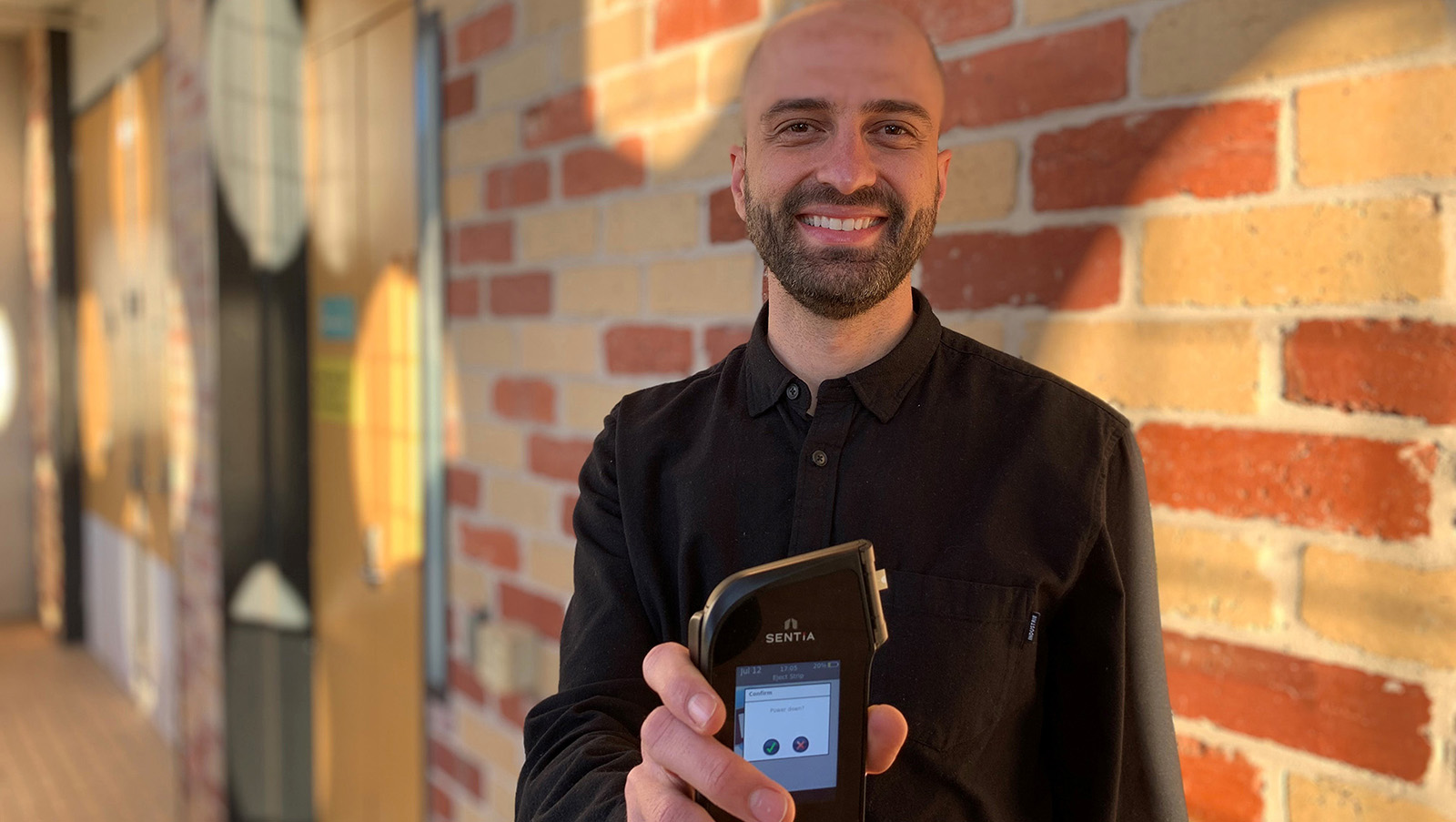Researchers work to develop rapid cancer detection from a single drop of blood

Postdoctoral research fellow Dr Saimon Moraes Silva has been working with industry partner, Universal Biosensors, to develop a handheld device that can detect a cancer biomarker from a finger prick of blood.
In summary
- Swinburne researchers have been working with Universal Biosensors to develop technology to detect cancer from a single drop of blood
- The technology is a handheld electrochemical device, similar to the glucose meters used by diabetics
- The device could potentially be used by GPs and oncologists to test cancer patients in remission
- It is hoped the product can be brought to market within the next five years
Detecting and monitoring cancer through a simple finger prick blood test is the goal of a joint project between Swinburne and industry partner Universal Biosensors (UBI).
Using UBI’s electrochemical platform, Swinburne researchers have been working to develop a biosensor for the Tn antigen, a biomarker used for detecting, staging and monitoring cancer.
“The Tn antigen is a universal cancer biomarker because this molecule is present in more than 80 per cent of carcinomas,” says Swinburne’s Dr Saimon Moraes Silva. “You don’t see this molecule in healthy people.”
Dr Moraes Silva has been working on this project for three years under the supervision of Professor Simon Moulton from Swinburne’s School of Science, Computing and Engineering Technologies and Iverson Health Innovation Research Institute.
“The Tn technology has been developed through ARC Discovery grant funding and we are very excited to be working with UBI to translate this research into a commercial product that will have significant impact for cancer patients,” says Professor Moulton.
Swinburne has partnered with UBI to develop this technology, which is a handheld electrochemical device, similar to the glucose meters used by diabetics.
“We have developed a surface chemistry based on a molecule called lubricin,” says Dr Moraes Silva.
“Our device would only require a very tiny amount of blood – less than 20 microlitres. There is no need for sample preparation and you get an on the spot result.”
Ideally, he says, the devices could be used by GPs and oncologists to routinely test their cancer patients in remission.
Low limit of detection
Another advantage of this device is its extremely low limit of detection. “We can detect very low concentrations of the Tn antigen, in the range of 10-12 picomolar, which is a very low concentration,” Dr Moraes Silva says.
“We think there is the potential to also use it for early diagnosis because it could detect this Tn antigen even before a tumour starts to develop.”
Clinical testing on patients in Melbourne and in Europe are about to start and it is hoped the product can be brought to market within the next five years.
“To be able to identify and measure, then monitor the rate of a healthy human cell becoming a cancer cell from a handheld point-of-care biosensor device is an exciting prospect for UBI,” says CEO of UBI, John Sharman.
“It would be wonderful if this initiative could improve the lives of many of the 80 million carcinoma remission patients around the world.”
Swinburne and Deakin Institute of Frontier Materials will also work with UBI to fast-track the development of other biosensors, using UBI’s electrochemical platform technology.
Universal Biosensors was a pioneer in blood glucose meters. Founded in 2001, UBI, specialises in the design and development of electrochemical cells (strips) used in conjunction with point of use devices that are used in various industries such as healthcare point of care, food and beverage and agriculture.
-
Media Enquiries
Related articles
-

- Astronomy
- Technology
- Health
- Science
- University
- Sustainability
- Engineering
Swinburne highly cited researchers reach the top in 12 fields
Ten Swinburne academics have been named on the Highly Cited Researchers 2025 list, released by Clarivate
Tuesday 02 December 2025 -

- Technology
- Health
- Science
- University
$1.2m ARC funding to boost national X-ray spectroscopy capability through Swinburne and QUT partnership
Swinburne has secured $1.2 million in the latest Australian Research Council Linkage Infrastructure, Equipment and Facilities scheme round
Tuesday 02 December 2025 -

- Astronomy
- Technology
- Science
- Engineering
Meet Swinburne’s Roo-ver Mission team
Roo-ver will be Australia's first lunar rover, and it’s being designed, built and tested in Australia. Swinburne is playing a key role in the design and construction of Roo-ver, through its involvement in the ELO2 Consortium.
Wednesday 26 November 2025 -

- Technology
- Health
- Science
- University
- Aviation
- Engineering
Swinburne’s Mobile Innovation Lab hits the road
Swinburne’s Mobile Innovation Lab is a cutting-edge mobile facility designed for research, industry collaboration, STEM education, training and outreach.
Thursday 06 November 2025 -

- Health
- Science
Swinburne and Bionics Institute announce strategic alliance to accelerate medical device research
The Bionics Institute will partner with Swinburne University of Technology in a first-of-its-kind collaboration to accelerate the development of life-changing medical devices.
Thursday 13 November 2025

